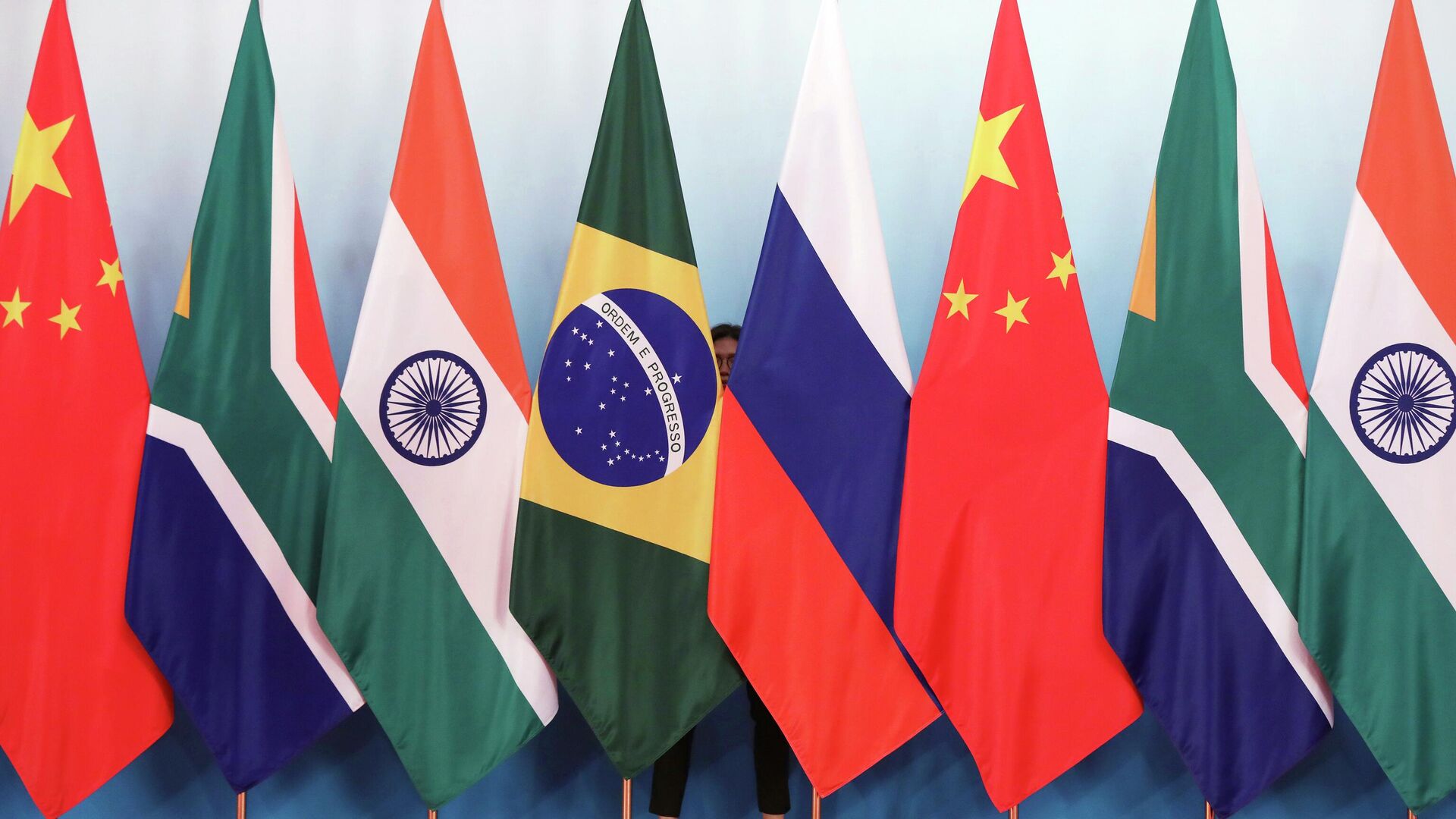https://sputnikglobe.com/20230616/de-dollarization-drive-economic-growth-prospects-fueling-brics-appeal--1111205476.html
De-Dollarization Drive, Economic Growth Prospects Fueling BRICS Appeal
De-Dollarization Drive, Economic Growth Prospects Fueling BRICS Appeal
Sputnik International
BRICS' allure rests in interesting business opportunities, particularly in view of the de-dollarization trend and geopolitical tensions, a Swiss professor has argued.
2023-06-16T10:13+0000
2023-06-16T10:13+0000
2023-06-16T10:13+0000
charles krauthammer
egypt
washington
switzerland
brics
expansion
analysis
https://cdn1.img.sputnikglobe.com/img/07e6/0b/01/1102914691_0:160:3073:1888_1920x0_80_0_0_59e38c0ffd640d1997f88b70232a3e51.jpg
Lately, numerous nations have lined up to knock on BRICS' door, and that number continues to rapidly grow. The ever-increasing popular bloc of emerging economies is made up of Brazil, Russia, India, China and South Africa and accounts for 25% of global GDP. Last year, Iran and Argentina officially filed to join BRICS alongside 11 other applicants. Several nations have shown their eagerness to join up as well, including Egypt. Recently, Algerian President Abdelmadjid Tebboune called for accelerating his country's entry to BRICS.Many experts and officials believe that with America's "unipolar moment," a popular term coined by Charles Krauthammer in the early 1990s, on the wane as multipolarity rises, BRICS has becoming increasingly more credible than any of the Washington-led organizations. The reasons behind it are several, ranging from relentless US attempts to maintain its dominance at all costs to the so-called "exorbitant privilege" provided by the US through the dollar's role as the international reserve currency, to which BRICS appears to offer a viable alternative.In late March, Egypt formally applied to join the New Development Bank (NDB) founded under the auspices of BRICS, raising the obvious question: what could the North African country possibly offer the bloc and vice versa?
egypt
washington
switzerland
Sputnik International
feedback@sputniknews.com
+74956456601
MIA „Rosiya Segodnya“
2023
News
en_EN
Sputnik International
feedback@sputniknews.com
+74956456601
MIA „Rosiya Segodnya“
Sputnik International
feedback@sputniknews.com
+74956456601
MIA „Rosiya Segodnya“
brics expansion, de-dollarization trend, us unipolar moment, economic growth, global south
brics expansion, de-dollarization trend, us unipolar moment, economic growth, global south
De-Dollarization Drive, Economic Growth Prospects Fueling BRICS Appeal
BRICS has proven itself to be an increasingly desirable club to join, since it offers dynamic and profitable business prospects, especially in light of the de-dollarization trend and geopolitical tensions, Sergio Rossi, professor of Macroeconomics and Monetary Economics at the University of Fribourg, Switzerland, told Sputnik.
Lately, numerous nations have lined up to knock on BRICS' door, and that number continues to rapidly grow. The ever-increasing popular bloc of emerging economies is made up of Brazil, Russia, India, China and South Africa and accounts for 25% of global GDP. Last year, Iran and Argentina officially filed to join BRICS alongside 11 other applicants. Several nations have shown their eagerness to join up as well, including Egypt. Recently, Algerian President Abdelmadjid Tebboune called for accelerating his country's entry to BRICS.
"The BRICS circle is becoming increasingly appealing to other countries, as it represents an interesting and profitable business opportunity for a growing number of stakeholders across the global economy, particularly as a result of the increasing willingness to get rid of the so-called dollar-dominance, which has been dictating both firms and governments' decisions in emerging and developing economies around the world. As the number of countries in such a circle increases, the benefits for them become more and more relevant, particularly in regard of economic growth and business opportunities. The geopolitical tensions that are currently affecting a number of European economies provide an additional factor for participating in the BRICS club before long," Sergio Rossi said.
Many experts and officials believe that with America's "unipolar moment," a popular term coined by
Charles Krauthammer in the early 1990s, on the wane as multipolarity rises, BRICS has becoming increasingly more credible than any of the
Washington-led organizations. The reasons behind it are several, ranging from relentless US attempts to maintain its dominance at all costs to the so-called "
exorbitant privilege" provided by the US through the dollar's role as the international reserve currency, to which BRICS appears to offer a
viable alternative.
"The main reasons for this shift to the BRICS community are twofold. On the one hand, it has become crystal clear that the US policy stance is a major factor of geopolitical tensions across the global economy, particularly as regards foreign trade and economic development. On the other hand, Washington-led organizations have been trying to preserve the key role of the US dollar in the global economy as well across financial markets, where a still increasing number of financial institutions have been suffering from the US-dollar dominance, since the US banking sector has revealed its own systemic financial fragility in the aftermath of Silicon Valley Bank's collapse, which induced a domino effect affecting other regional banks rapidly and dramatically for both their depositors and shareholders," Rossi said.
In late March, Egypt formally applied to join the New Development Bank (NDB) founded under the auspices of BRICS, raising the obvious question: what could the North African country possibly
offer the bloc and vice versa?
"Egypt represents an interesting market for BRICS countries, as regards foreign trade as well as foreign direct investment opportunities. Economic and financial activities could benefit of Egypt's entry to the BRICS club, whose dynamics might be supported by this entry. There is a 'win-win' dynamics that could give rise to a regional economic and financial integration in order to offer an alternative currency area with regard to the US-dollar dominance across the global economy," Rossi explained.




